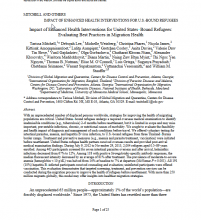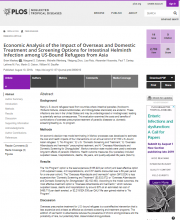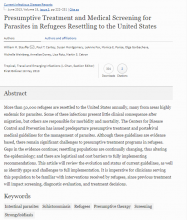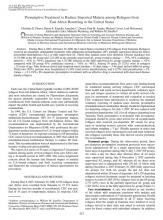Publications Search
This publications portal is a repository of all IOM migration health publications from 2006 to present where IOM was a primary contributor.
Publications include peer-reviewed scientific papers, technical reports, training guides/manuals, policy briefs/discussion papers, factsheets, newsletters, research reviews, conference and poster presentations. These are categorized by topic, author, country/region covered as well as by year, language, and type of publication. The map reflects the countries covered by the publications.
To browse or search: simply use the filter options on the left-hand side. Alternatively, you can enter keyword/s in the search box. Selecting a specific publication will lead to a ‘download’ link or link to the website where the document is housed. Here is the step-by-step guide for your reference.

Impact of enhanced health interventions for United States–bound refugees: Evaluating best practices in migration health
Author/s: Tarissa Mitchell, Deborah Lee, Michelle Weinberg, Christina Phares, Nicola James, Kittisak Amornpaisarnloet, Lalita Aumpipat, Gretchen Cooley, Anita Davies, Valerie Daw Tin Shwe, Vasil Gajdadziev, Olga Gorbacheva, Chutharat Khwan-Niam, Alexander Klosovsky, Waritorn Madilokkowit, Diana Martin, Naing Zaw Htun Myint, Thi Ngoc Yen Nguyen, Thomas Nutman, Elise O’Connell, Luis Ortega, Sugunya Prayadsab, Chetdanai Srimanee, Wasant Supakunatom, Vattanachai Vesessmith, William Stauffer
With an unprecedented number of displaced persons worldwide, strategies for improving the health of migrating populations are critical. United States–bound refugees undergo a required overseas medical examination to identify inadmissible conditions (e.g., tuberculosis) 2–6 months before resettlement, but it is limited in scope and may miss important, preventable infectious, chronic, or nutritional causes of morbidity. We sought to evaluate the feasibility and health impact…
Read more
Economic Analysis of the Impact of Overseas and Domestic Treatment and Screening Options for Intestinal Helminth Infection among US-Bound Refugees from Asia
Author/s: Brian Maskery, Margaret S. Coleman, Michelle Weinberg, Weigong Zhou, Lisa Rotz, Alexander Klosovsky, Paul T. Cantey, LeAnne M. Fox, Martin S. Cetron, William M. Stauffer
BACKGROUND: Many U.S.-bound refugees travel from countries where intestinal parasites (hookworm, Trichuris trichuria, Ascaris lumbricoides, and Strongyloides stercoralis) are endemic. These infections are rare in the United States and may be underdiagnosed or misdiagnosed, leading to potentially serious consequences. This evaluation examined the costs and benefits of combinations of overseas presumptive treatment of parasitic diseases vs. domestic screening/treating vs. no program.
…
Read more
Presumptive Treatment and Medical Screening for Parasites in Refugees Resettling to the United States
Author/s: William M. Stauffer, Paul T. Cantey, Susan Montgomery, LeAnne Fox, Monica E. Parise, Olga Gorbacheva, Michelle Weinberg, Annelise Doney, Lisa Rotz, Martin S. Cetron
More than 50,000 refugees are resettled to the United States annually, many from areas highly endemic for parasites. Some of these infections present little clinical consequence after migration, but others are responsible for morbidity and mortality. The Centers for Disease Control and Prevention has issued predeparture presumptive treatment and postarrival medical guidelines for the management of parasites. Although these guidelines are evidence based, there remain significant challenges to…
Read more
Presumptive Treatment to Reduce Imported Malaria among Refugees from East Africa Resettling in the United States
Author/s: Christina Phares, Bryan Kapella, Annelise Doney, Paul Arguin, Michael Green, Leul Mekonnen, Aleksander Galev, Michelle Weinberg, William Stauffer
Abstract: During May 4, 2007–February 29, 2008, the United States resettled 6,159 refugees from Tanzania. Refugees received pre-departure antimalarial treatment with sulfadoxine-pyrimethamine (SP), partially supervised (three/six doses) artemether-lumefantrine (AL), or fully supervised AL. Thirty-nine malaria cases were detected. Disease incidence was 15.5/1,000 in the SP group and 3.2/1,000 in the partially supervised AL group (relative change = –79%, 95% confidence…
Read more